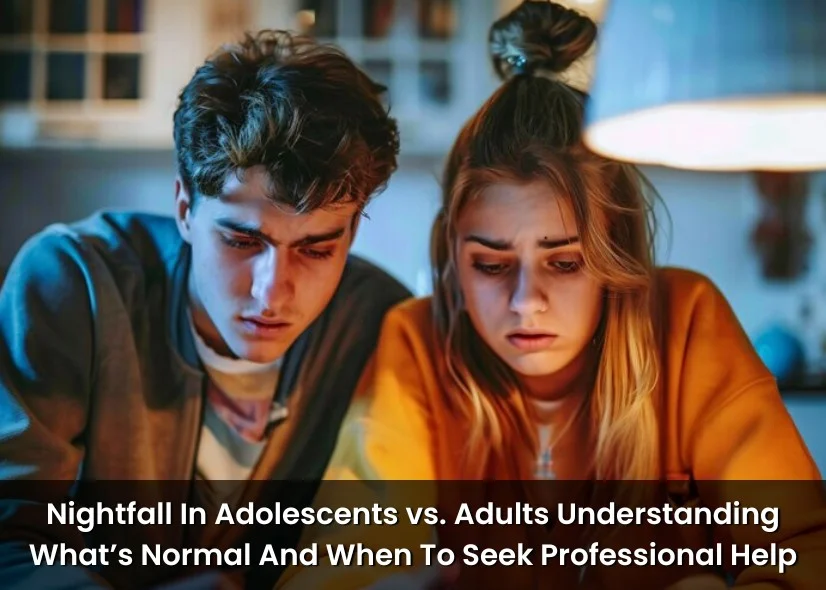Nightfall, commonly known as nocturnal emission or wet dreams, is a natural phenomenon where an individual experiences an involuntary ejaculation during sleep. It is often surrounded by myths and misconceptions, leading to unnecessary anxiety, particularly among adolescents. Understanding the differences in how nightfall manifests in adolescents and adults is crucial in distinguishing what is normal from what might require professional attention. This blog explores the causes, frequency, and implications of nightfall in both age groups, and provides guidance on when to seek help.
What Is Nightfall?
Nightfall occurs when semen is released during sleep, usually accompanied by erotic dreams. It is a normal part of male physiology, especially during puberty, when hormonal changes are at their peak. While it primarily affects males, females can also experience similar phenomena involving lubrication and arousal during sleep.
Nightfall In Adolescents
- Hormonal Surge
During adolescence, the body undergoes significant hormonal changes, particularly an increase in testosterone levels. This surge is often accompanied by heightened sexual thoughts and dreams, which can trigger nightfall. - Frequency
For adolescents, experiencing nightfall a few times a month is common. This frequency tends to vary widely among individuals and is influenced by factors such as hormonal activity, sexual arousal, and personal habits like masturbation. - Psychological Impact
Many adolescents may feel embarrassed or anxious about nightfall, especially if they lack proper sexual education. Myths surrounding nightfall can lead to feelings of guilt, shame, or fear of health problems, even though it is a natural process.
Nightfall In Adults
- Reduced Frequency
As men transition into adulthood, the frequency of nightfall typically decreases. This reduction is due to the stabilization of hormonal levels and the regularization of sexual activity. Adults who are sexually active or masturbate frequently may experience nightfall less often. - Emotional and Physical Factors
For adults, nightfall can sometimes be linked to emotional stress, anxiety, or sexual frustration. While less frequent than in adolescents, it can still occur due to psychological or physiological factors like prolonged sexual abstinence. - Health Implications
Occasional nightfall in adults is normal and usually doesn’t indicate any health issues. However, frequent nightfall accompanied by discomfort or fatigue may require a deeper examination of lifestyle or emotional well-being.
When Is Nightfall aA Cause For Concern?
While nightfall is a normal part of sexual health, certain scenarios might indicate the need for professional consultation:
- Excessive Frequency
If nightfall occurs very frequently (more than a few times a week) and is accompanied by physical discomfort, fatigue, or disrupted sleep, it could be a sign of underlying health issues such as hormonal imbalance or psychological stress. - Psychological Distress
Feelings of extreme guilt, anxiety, or depression related to nightfall should be addressed with professional help. Persistent negative emotions can impact mental health and overall well-being. - Physical Symptoms
Experiencing pain during ejaculation, blood in the semen, or other unusual symptoms warrants a medical evaluation. These could be signs of infections, prostate issues, or other medical conditions requiring attention.
Managing Nightfall
- Education and Awareness
Proper sexual education is crucial in helping individuals understand that nightfall is a normal and natural phenomenon. Dispelling myths can alleviate unnecessary anxiety and promote a healthier attitude towards sexual health. - Healthy Lifestyle
Maintaining a balanced diet, regular exercise, and good sleep hygiene can help regulate bodily functions, including those related to sexual health. Managing stress through relaxation techniques like meditation or yoga can also reduce the frequency of nightfall. - Open Communication
Encouraging open discussions about sexual health, especially among adolescents, can help normalize the conversation around nightfall. Parents, educators, and healthcare professionals play a pivotal role in providing accurate information and emotional support. - Seeking Professional Help
For persistent concerns about nightfall, consulting a healthcare provider, such as a urologist or a counselor, can provide reassurance and appropriate guidance. Professional help is particularly important if nightfall is causing significant emotional distress or physical discomfort.
Nightfall is a natural and common experience, especially during adolescence. While its frequency tends to decrease in adulthood, it remains a normal part of sexual health for many men. Understanding the differences between nightfall in adolescents and adults, and knowing when to seek professional help, can alleviate unnecessary anxiety and promote a healthier approach to sexual well-being. By fostering awareness and providing accurate information, individuals can better manage their experiences with nightfall and maintain overall sexual health.

